House Republicans Advance Plan to Halve GAO's Funding
Provisions Would Curbs GAO’s Authorities on Impoundment and Oversight and Prevent GAO from Serving Non-Appropriators & Non-Defense Committees
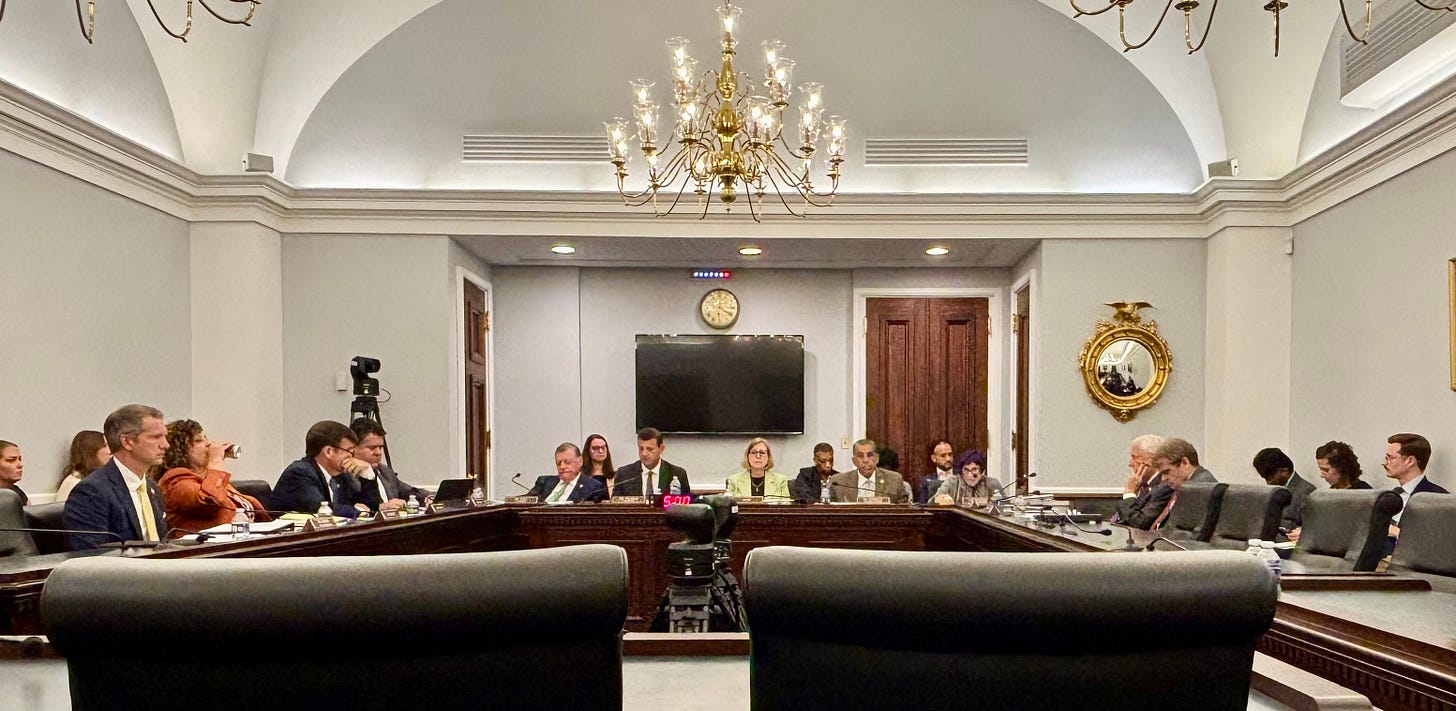
Monday evening, House Legislative Branch appropriators voted 6 to 4 on party lines to cut GAO’s funding by 50% and reduce the Library of Congress’s funding by 12%.1 This would lay waste to Congress’s watchdogs and information experts. The traditionally bipartisan appropriations subcommittee had little debate and, according to one member, no opportunity to offer amendments. Full committee markup is scheduled for Thursday.2
Beyond eviscerating GAO’s funding and decimating the Library’s, the text of the legislation contains two unwelcome surprises. It prevents GAO from filing civil suit concerning the administration’s unconstitutional impoundments of appropriated funding. It also restricts GAO’s ability to operate independently. I discuss these issues below.
I also share newly-obtained data on how these cuts affect congressional committees. Based on a preliminary review of the numbers, GAO will become unable to respond to the vast majority of requests from committee chairs and ranking members for investigations.
Stopping GAO Lawsuits on Impoundment
The bill would prevent GAO from using its statutory authority to bring a civil lawsuit against the White House should it determine the administration unlawfully impounded funds. GAO will be unable to exercising its statutory authorities unless Congress first adopts a concurrent resolution.3
GAO would not be allowed to expend funds under 2 USC 687. Here is that provision.
As you can see, Congress enacted a law (in 1974!) empowering GAO to bring a civil action should the White House refuse to spend funds appropriated by Congress. The proposed appropriations language would prevent GAO from carrying out its longstanding authorities on impoundment by preventing it from spending funds. (Oh, the irony.)
Some Congressional Republicans justify this by attacking GAO for bias. They claim this bill would redirect GAO’s efforts and cut “funding to curtail the agency’s self-directed, liberal initiatives.” Liberals might be glad to take credit for GAO’s saving taxpayers billions of dollars in its attacks on waste, fraud, and abuse. However, cost savings via GAO historically have been a bipartisan effort with across-the-board political support.
No less an authority than Dr. Tom Coburn, a very conservative former member of Congress and chair of the Senate Homeland Security and Governmental Affairs Committee, wrote in his 2011 report on deficit reduction that “we are fortunate to be provided unbiased blue prints that could form a solution from one well-respected, non-partisan agency, the Government Accountability Office (GAO).” The context was GOP efforts to cut funding for GAO. The name of that report: Shooting the Messenger: Congress Targets the Taxpayers’ Watchdog.
A recent Brookings Institution paper analyzing GAO’s involvement in the appropriations process found “GAO has consistently applied appropriations law across the last three administrations, with no evidence of bias in its findings on executive branch conduct.” Let’s be direct: some House Appropriators are aligning themselves with the White House’s efforts to wrest control of the purse from the Legislative branch. This contravenes the founder’s wishes and good public policy.
Chaining the Watchdog
A second legislative provision places barriers on the GAO’s ability to pursue projects or activities that are not requested by Congress or not required by law unless GAO first notifies appropriators of what they plan to do and why.
GAO already has broad statutory authority from Congress to act that provides the agency with significant responsibilities. Among its activites are providing legal advice to members of Congress, handling bid protests, providing technical assistance to Congress in drafting laws, and conducting thousands of investigations at the request of Congress and under its own authority. Presumably, that work — the vast majority of what GAO does — would not be touched by this provision.
This provision seems intended to curtail GAO’s oversight of impoundment. GAO routinely monitors Executive branch activities and prepares some work in advance of a congressional request. Unless asked by a member of Congress, GAO would now presumably have to wait for a request or inform appropriators of its intention to proceed.
Kneecapping Committee Oversight
Who does GAO serve? I filed a records request with GAO to better understand how Congress uses the watchdog agency. I asked for five years of data about who asks GAO to do work and where it sends its reports.
They provided me a high level overview and two spreadsheets. The chart below illustrates the number of mandated and requested GAO reports by fiscal year.
The yellow color (on the bottom) shows reports mandated by Congress. These are reports Congress required of GAO through bill text, report language, or conference committee language. The orange color (on the top) shows reports requested by Congress. These are reports requested by leadership, committee chairs, and/or ranking members.
The order of precedence for which reports are undertaken is governed by GAO’s Congressional Protocols. They prioritize congressional mandates, then requests from senior congressional leaders and committee leaders, and finally individual member requests. GAO has not had sufficient resources to address individual member requests for some time.
Please note the FY 2024 data is a little unusual because Congress failed to pass an appropriations bill. Those bills and accompanying committee reports usually contain a large number of directions for GAO reports. Also note the FY 2025 data is incomplete because the fiscal year is not over and major bills such as appropriations and the NDAA have yet to be enacted.
Here is the same information in table form.
It appears that the number of mandated reports is increasing — at least in years where appropriations bills are enacted. If you add up all the reports in FY 2020-FY2024, the total is 2,135 reports. Of those, 1,106 were mandated and 1,029 were requested. If GAO’s funding is cut in half, it is likely the agency would be unable to complete many — if any — of its requests. How does that shake out?
Let’s start by looking at mandated reports. Drawing from GAO’s data, Armed Services and Appropriators have by far and away the most mandated reports. Congress’s consideration of the appropriations and NDAA bills means they can easily direct GAO to send reports to them.
The House Armed Services Committee had 517 mandated reports, followed by House Appropriations at 448, Senate Appropriations at 446, and Senate Armed Services at 437. After that, the number jumps down to a mere 132 for Senate Commerce Committee. The chart below shows the top twenty committees organized by the number of mandated reports they received from FY 2020-2024. (A single report may be sent to more than one committee.)
My hypothesis: the vast majority of committee chairs and ranking members request reports from GAO but do not mandate them. If that’s right, guess who’s going to get the short end of the stick should appropriators succeed in cutting GAO’s funding by 50%? Either everyone who is not an appropriator or on Armed Services will have to find a way to mandate their reports — or their requests simply won’t get answered. GAO won’t have the resources to help them.
By the way, GAO provided me a list of 156 recurring reports. The oldest required recurring report dates back to 1982. I haven’t analyzed the data, but a skim suggest the vast majority of recurring reports were written into law by appropriators and the Armed Services Committee.
I suspect most appropriators, most members of the Armed Services committees, and the 90%+ of members who don’t sit on those committees — including the chairs and ranking members — are unaware that a 50% cut to GAO means Congress’s watchdog will not be available when members ask.
What’s Next
On Wednesday, House Appropriators will release the report language to accompany the appropriations bill. Report language is very powerful and in many ways contains policy direction to the entities funded through appropriations. We will see what is in store. Unlike the appropriations bills, report language can become operative when it is reported out of committee.
On Thursday, during the full committee markup, we will also see what amendments, if any, are offered to the full appropriations bill.4
It is my hope that the House is trying to send a message — and will back off these draconian measures. If they do not, let us hope the Senate works to protect Congress’s institutional interests.
I’m comparing FY 2026 against FY 2024, but the numbers are essentially the same for FY 2025. I’m using FY 2024 because Congress enacted an appropriations bill for that year; FY 2025 was a continuing resolution.
I am grateful to subcommittee committee staff for helping me to attend the hearing in person. Security measures prevent the public from attending public hearings in the Capitol without an escort, which they graciously provided. I’ve worked with the Legislative branch appropriations committee for fifteen years and they have always treated me with courtesy. Over the years, they have graciously agreed to meet with me when I had suggestions for items to include in the appropriations bills. It’s my view that the politics of congressional deference to the Executive branch that has taken hold in the highest reaches of both chambers has begun to seep in to even the most institutionalist committees. That is a tragedy.
Ironically, I think this may violate the Supreme Court’s decision in INS v. Chadha. A “concurrent resolution” is one that “must be passed in the same form by both houses, but they do not require the signature of the president and do not have the force of law.” Congress can only act by a law that passes both houses and is signed by the president. GAO’s authority in this matter is statutory. How could GAO be restrained unless it is given approval in this way?
I hope to provide an analysis of the Legislative branch appropriations bill line-item by line item. The preliminary work on that is already done, but this article is already too long.



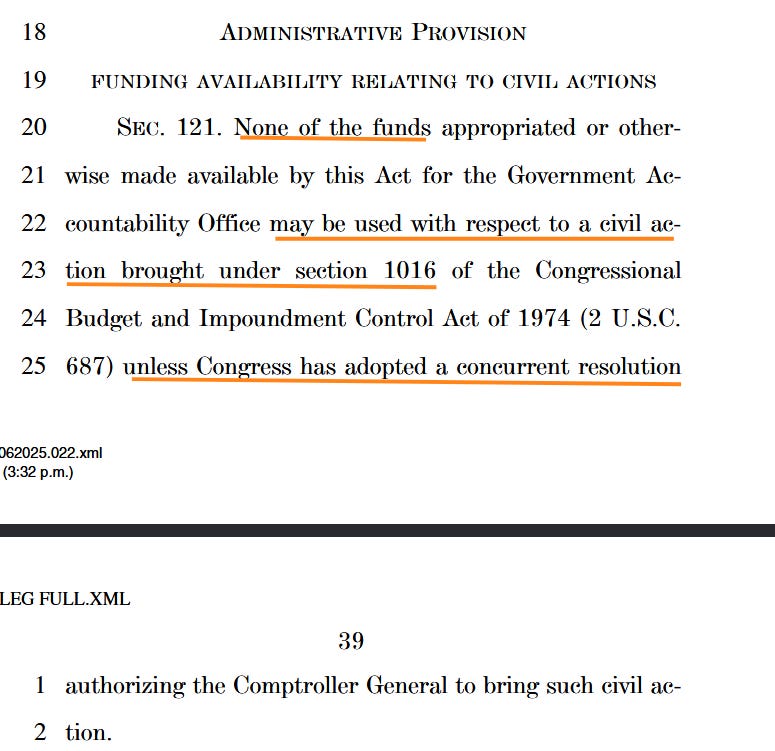
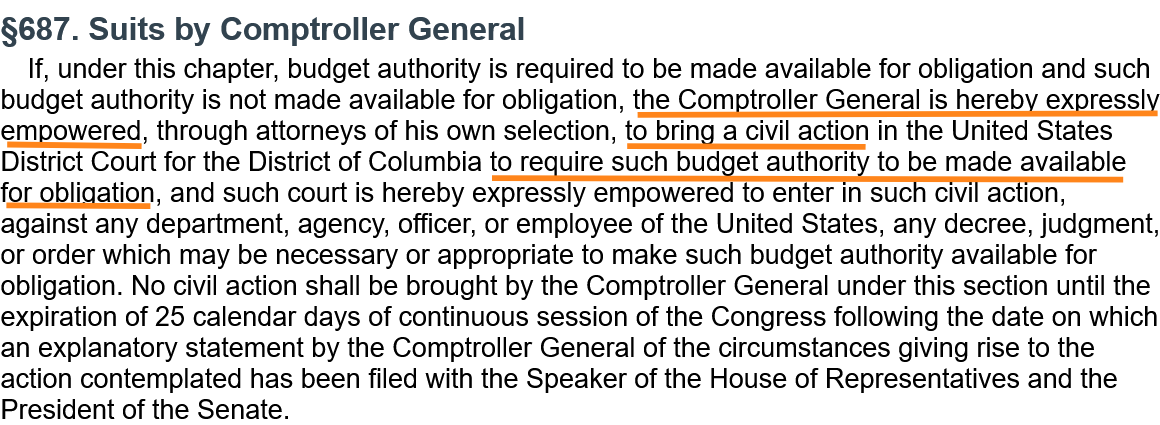
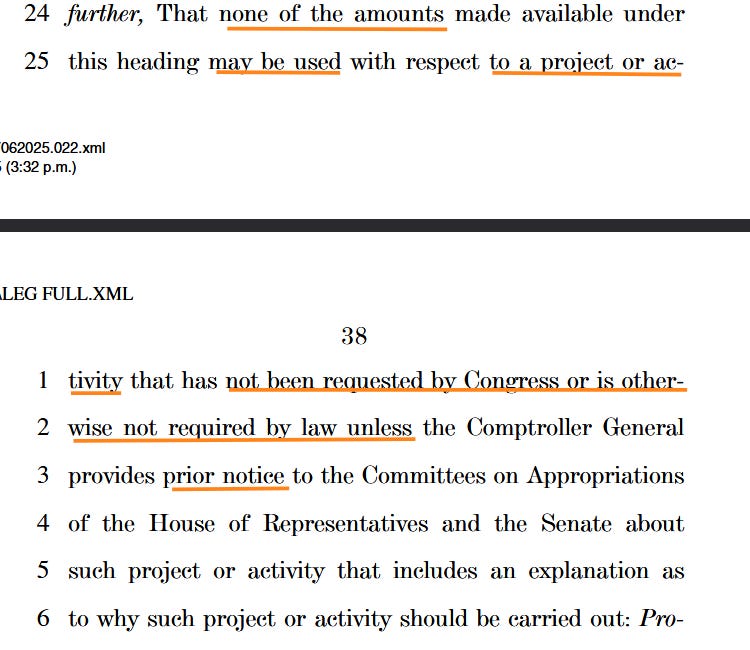
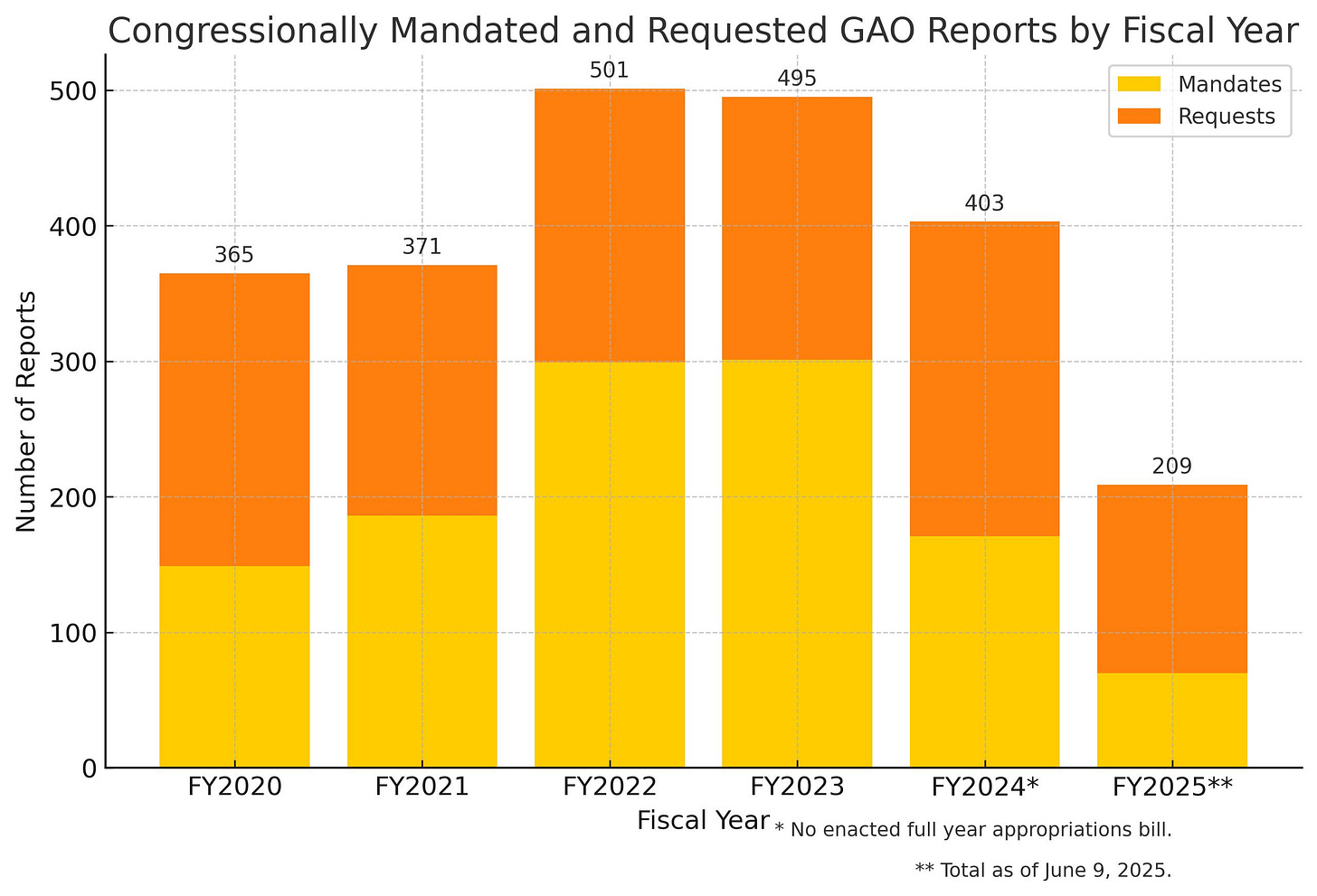
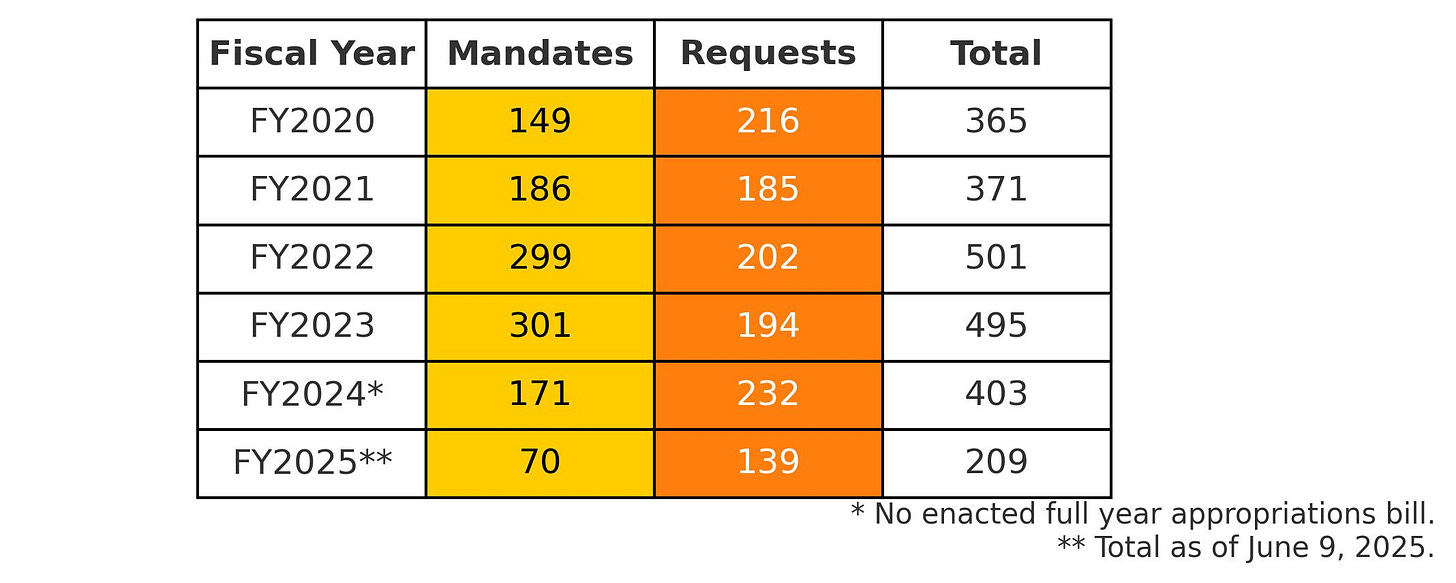
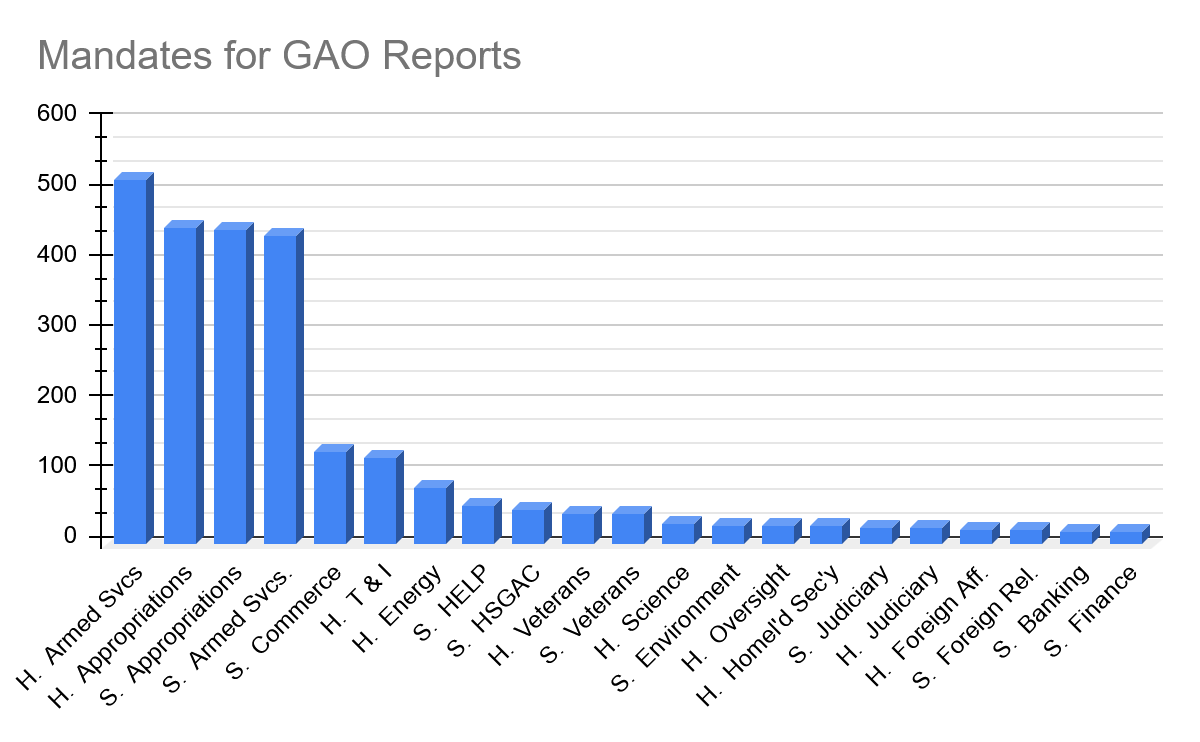
As you've pointed out many times before the current government agencies are certainly not perfect and could be improved through thoughtful legislation. It must, therefore, be particularly galling to be aware of the past and watch the dismantling of the framework of our government on a daily basis.
The goals of the House, and to a lesser extent (maybe) the Senate, seem to be removal of the gatekeepers and investigative elements of government. The outcome of these efforts could be as simple as it appears on the surface. Evisceration of traditional government in favor of a pseudo-government beholding to the President and Congressional leaders of a particular party.
I guess we'll see since there is apparently no way to slow the juggernaut.
I can’t believe Congress is voting to kill its own power. If this passes, it’s the end of our checks and balances system. We might as well make the president a king and let him do whatever he wants.